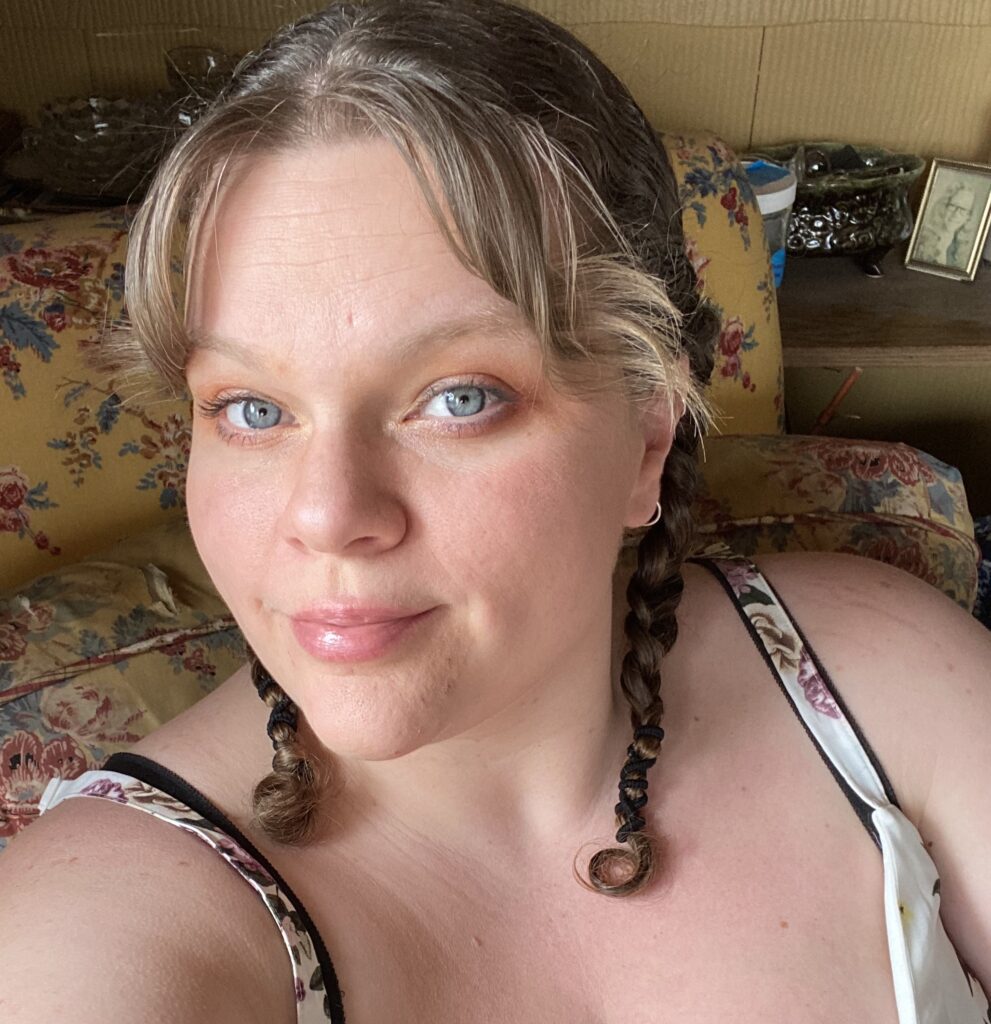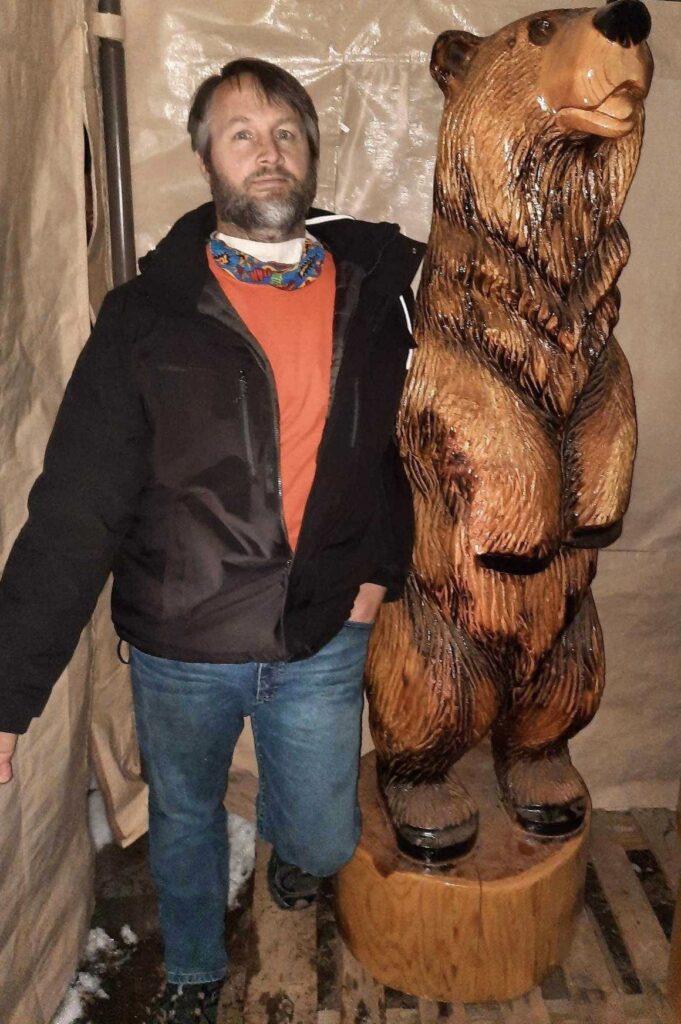Helping Community and Carving Out a Niche at Peaceful Pines Farm
By Robin Milligan
“When I first started chainsaw carving professionally, I was a production carver,” Alex Schulz said. “I put them out fast. This is different. I carved all day today on one carving. It’s so nice to slow it down and take my time and geek out on the carving. When I was carving full time, I didn’t get to do that.”
Alex began his chainsaw carving journey in 1996. His brothers were both chainsaw carvers at the time and he watched them for a summer and began to explore the process for himself. Before chainsaw carving, in his youth, Alex’s father was a sculptor and attending art school. He had four brothers and a sister. Their family had a small-scale bronze foundry in their home when Alex was growing up, and he began carving at a young age, using the lost wax technique to create sculptures.
“Chainsaw carving beats you up,” Alex said. “I went to pharmacy school to let my body heal. As long as I take it easy and don’t do too much, I can do anything I want. I just really like doing it. It’s fun.”
Now, Alex carves in his free time and takes his time, carefully creating pieces of art out of wood that he loves. Each hand-crafted creation has character and feels like it could come to life. His bears are adorable and his eagles are regal.
“Like most chainsaw carvers, I use three to four saws. I start with the big saw, take off the biggest pieces to get a basic form. Then the medium saw rounds the rough edges and gets the piece ready for detail. The small saw is for creating the details. There are also specialized tools for doing different techniques, and hand tools for some of the finishing. It shouldn’t take strength if you’re doing it right. Don’t use a dull chain. As long as your chain is sharp it takes finesse more than muscle. It’s like wielding 47 chisels simultaneously.”
Alex continued: “With the bar straight, it’s like using a skill saw. If you turn the bar parallel and skim it, you can peel a log like a carrot. It is a process. When you draw, you start with a blank page. You put lines on and you shade and you put more lines on until you have something. Chainsaw carving is subtractive. You take away until you have something. Wood is mailable. You’re not carving it to be realistic, it’s all abstract. When I carve a bear, it isn’t that I’m carving what I think a bear looks like. It’s what I think a bear should look like. That isn’t what bear hair looks like, it’s what I want it to look like. Symmetry is not interesting, the bears with asymmetrical faces sell the fastest.”
When I asked Alex what his favorite part of chainsaw carving is, he replied, “When I have my log and I have my idea of what I’d like to do, when I have it blocked out and I can see that it’s all there and that it is going to come together, that is my favorite part. When I get over the hump and I can see it’s going to turn out. Art is problem solving, and I like the part when the problem is solved and I can see the outcome.”
Alex’s wife, Merrilee, helps out in the shop, and their oldest son, Lucas, has also been carving since the beginning of last summer. He’s learning quickly and enjoying the process, but school is his number one priority.
The Schulz’s are working to create a multi-faceted family farm with a large garden to grow seasonal produce to sell alongside their hand-crafted goods, artwork, signs, chainsaw carvings, and anything that can be made from the forest and materials on hand.
Their mission is to help their neighborhood and surrounding areas have access to fresh and affordable food, with no mystery about where or how it was grown. This is a community-first family, who do all they can to improve the lives of those around them, mostly selling to their neighbors and people who live within walking distance.
“We grow enough for our family, and we sell the excess,” Merrilee said. “Fresh herbs, cut flowers, potted native varieties of plants, herb and vegetable starts, baby trees, tomatillos, ground cherries, baby rose bushes, purple spinach, celery, lettuce, and more. We like to donate our extra veggie starts to local nonprofits. We always grow more than we need, so much of the time we also provide plants for our friends and families for their gardens.”
Peaceful Pines Farm includes 50 acres of woods, where the Schulz family forages for spruce tips, rose hips, miner’s lettuce, lamb’s quarters, and more. Merrilee makes her own tea blends that all sound like they taste incredible. She loves making use of everything they have grown and what nature provides. They have built many raised garden beds, a 30-foot-long bean tunnel, keyhole garden beds, and lots of compost!
Alex loves the science of soil. He’s a dedicated worm farmer. Merrilee is an artist and musician, and is also the Executive Director of the nonprofit, Clover Leaf Education. She teaches violin and is an avid gardener, mother, and she’s magic in the kitchen. Always tinkering and making new creations, she loves to put out a good spread where no one leaves hungry.
“Gardening changes the way that people eat and the way that people value food. My kids don’t like to weed or do the gardening work, but when it comes time to eat, they are right there at the table. They believe that our food is the best and it’s a point of pride for them. It’s a huge luxury to be able to make your own food that didn’t need to be transported. We get to bond and reconnect with the earth and soil. We make our own luxury,” Merrilee said. “We love sharing what we have with our neighbors. We love having the knowledge of where our food comes from. That is so rare.”
She also told me, “I love to adopt injured chicks from local stores and nurse them back to health. A fun side effect of that is that they get to wear the cutest sweaters.”
This family-owned-and-operated farm and chainsaw carving shop is centrally located and easy to access on Highway 2. If you want to visit their new store, Google may mislead you a bit. Look for the grey building. They are currently open Friday-Monday, when weather allows, from 9 a.m. until sunset.
Follow Peaceful Pines Farm on Facebook, Instagram, and YouTube for more. 35403 N Newport Hwy, Chattaroy, WA, 509-850-0463, [email protected].
Robin Milligan is a writer, artist, and entrepreneur living in Spokane, Wa. She curates art shows, runs an IT company, and teaches ceramics and painting from her home studio. When not working, Robin spends her time with her three children exploring nature, rockhounding, making art, and swimming.


